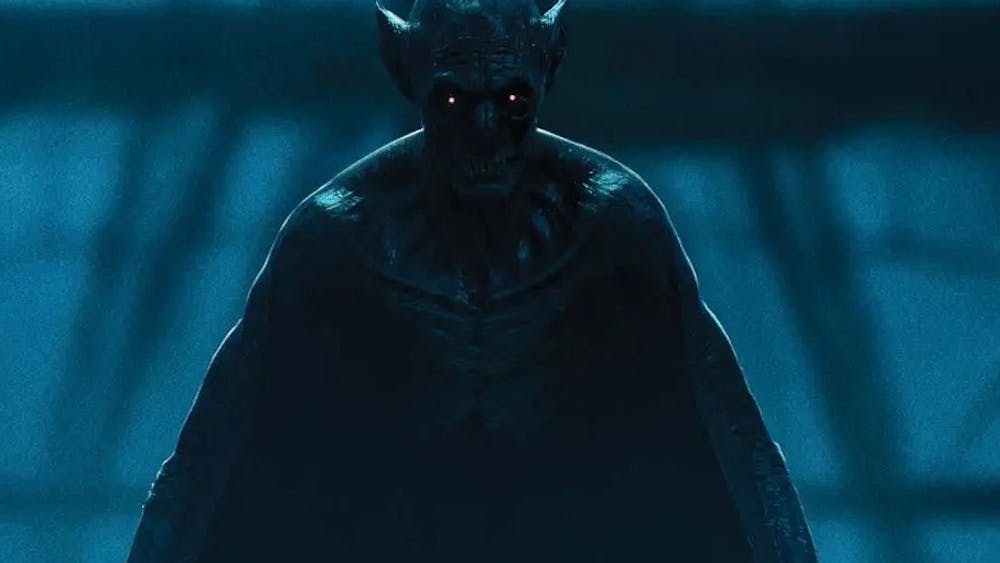This weekend at the MAC saw a momentous and intriguing artistic event that drew a spectacular crowd and focused attention on IU's importance in the art world. It was the U.S. premiere of "Jeppe," an opera composed by IU faculty member Sven-David Sandström.\nThe opera, appropriately subtitled "The Cruel Comedy," featured an interesting plot. Harry Schoenberg, a wealthy and famous publisher has rejected the poetry of Jeppe, which caused the latter to sink into a ten-year period of writer's block. In addition to all his literary troubles, Jeppe's wife cheats on him and ultimately runs off. Soon after, Jeppe becomes convinced that he has died and gone to heaven -- in fact, he's the subject of a reality TV show, a world where he is successful. Jeppe's dream world ends abruptly and violently, though, when he is sentenced to death by alcohol poisoning. He does not die, however; and the opera ends happily when Schoenberg's agoraphobic wife Beatrice falls in love with Jeppe and the two live happily ever after.\nThe plot was unique, practically unknown anywhere else in opera. This feature made it really stand out as completely new, but still carrying on the operatic tradition. The characters were well-developed and displayed a wide variety of moods and an appropriate degree of dynamism.\nAlthough the librettist, Claes Fellbom, did a wonderful job with the general plot and characterization, the libretto itself left much to be desired. The tone did not at all lend itself easily to song. The language was much too conversational to be dignified in an operatic setting and the dialogue did not flow in a logical or direct pattern. Having the opera sung in English translation also added complications like awkward accents and odd placement of stresses. The most important point about the libretto, however, is that it was much too involved. Although complexity is a nice feature in general, setting such a complex plot in an operatic scene tended to distract the listeners from the music.\nSandström definitely deserves a great accolade for managing to create such an astounding musical work. His music cannot be characterized by one single word or phrase. It adjusted itself to the situation.\nBut no matter under what stylistic mask the music was played, it never once lost the quality of musicality that is essential to pleasing listeners. If there was one drawback to the music, though, it would definitely have been the secondary nature it played to the libretto. Since it changed character so much, the music took on an almost secondary role in a way diminishing the full effect it could have had.\nThere were some moments when the performers did some bizarre things. For example, the orchestra would occasionally erupt in dissonance or the chorus use more than their vocal chords to produce sounds. These oddities, however, were few and far between.\nThe stage design was especially interesting. Its main features were metal scaffolding, Christmas lights, multiple screens projecting images taped on stage, and a large, tilted stage surface that rose or descended according to the scene. The first three items definitely added a modern, mass-produced, industrial feel to the scene, which was warranted by the ultra-modern nature of the plot. Having on-stage cameras projecting images was an unique, if at times annoying, idea. Multiple angles, multiple screens, and the performers as well as their images on stage comprised a bit more action than could be adequately crammed onto a stage. However, the overabundance of action communicated a sense of the fast-paced, high-tech modern world, but this occurred at the expense of stage technique. Though somewhat logical in its use, having an excess of action tended to distract and disorient the viewers' eyes.\nOne must also give credit to the performers to be able to sing and walk on a slanted platform without so much as even a slip or a slide.\nThe performers themselves were of an unmatched caliber. It was evident that one not only had to be able to sing, but to speak as well and do both things in a convincing and realistic manner -- after all, the opera is about reality TV. \nThe cast was especially successful in executing the last of these functions, for without realism and convincing performance, the work would almost have seemed silly. The stars of the show were undoubtedly Michael Weinius as Jeppe and Reyna Carguill as Beatrice. One just had to admire Weinius's skillful intermingling of drama and song to create a convincing portrayal of Jeppe. Carguill's main asset was her enchanting voice and impressive range, while she also gave moving tears and smiles on stage. \nAndrew Hendricks's portrayal of the destructive Schoenberg was well done and Kate Lindsey's representation of Dolly, Jeppe's slut of a wife, was moving. It should also be noted that Lindsey made quite a piece of her aria "I Love Men." An especially impressive chorus with a prominent role was a fine buttress for the soloists as well as a wonderful ensemble on its own.\nAs a whole the opera cannot be described as something earth-shattering or phenomenal, but on the other hand it wasn't repulsive or offensive. It was a pleasing opera of average quality. The opera's main distinguishing feature is its uniqueness. It was definitely a break with the grand tradition in focusing on an untouched theme in a modern context. Everything about the opera from the characters to the language was modern and casual. Doing this, however, had both its advantages and its drawbacks. "Jeppe" definitely deserves a viewing based on its sheer uniqueness, if not for its interesting music.
Local opera breaks ground
Get stories like this in your inbox
Subscribe





